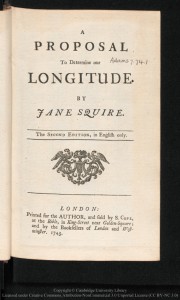By Anne Good, Assistant Curator
Since I’m still new to the collection at the James Ford Bell Library, I make time occasionally to page through the printed catalog that was published in 1994 and to learn more about various items. At the same time, I am always on the look-out for works by and about women in our holdings. Yesterday, I came across this entry:
Squire, Jane. A proposal for discovering our longitude. London, For the Author, sold by P. Vaillant and F. Needham, 1742.
“The second edition of a work written in 1731. This edition includes letters from the author charging that the work was not properly considered by the appropriate authorities for the prize offered for solving the problem of determining longitude at sea.”
The Bell also has a third edition of this work from 1743, which includes some additions from the author’s manuscript edition.

You will notice that the entry does not mention that Jane was a woman. When I first read it, I thought for sure that “Jane” was just a version of the male name, “Jan” or “Johannes,” as I had never heard of any woman being involved in the quest for longitude! However, this proposal is indeed the work of a woman — one of only two women who were involved in the debate.
While I was trying to find out more about Jane Squire, I discovered this awesome blog post, by Alexi Baker, and I wanted to share it. Here is an excerpt:
“Squire is also simply fascinating as a person. She bucked expectations for how an early modern woman should behave – investing in risky maritime salvage projects and suing important men over their outcome before dedicating herself to longitude – and for how open Catholics could be about their religion at a time when that still brought persecution and prosecution in Britain. She sometimes endured great hardship as a result, including three no doubt scarring years in prison. Her book, published in two editions in 1742 and 1743, reveals her to have been learned and eloquent (if verbose) and firmly dedicated to both her religion and the search for longitude.”




